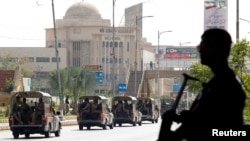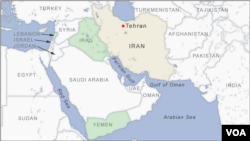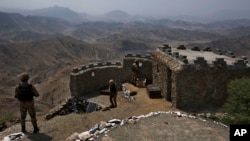Pakistan and Iran pledged Wednesday they would increase joint efforts against Afghanistan’s terrorism threat and urged Afghanistan’s hardline Taliban government to involve all Afghans in “basic decision-making.”
The two neighboring countries, which share long, porous borders with Afghanistan, made the promise in a joint statement released at the culmination of Iranian President Ebrahim Raisi’s three-day visit to Pakistan.
Both Tehran and Islamabad complain that transnational militant groups have increased cross-border terrorist attacks from Afghan sanctuaries since the Taliban reclaimed power in Kabul in 2021.
“Noting that the existence of terrorist organizations in Afghanistan poses a serious threat to regional and global security, the two sides reaffirmed their willingness to enhance cooperation on counterterrorism and security and to develop a united front against terrorism,” the statement reads.
Islamabad alleges militants tied to the globally designated terrorist outfit Tehrik-i-Taliban Pakistan, or TTP, are being sheltered on Afghan soil and even facilitated by the Taliban administration to conduct deadly cross-border attacks on Pakistani security forces and civilians.
Iranian authorities have blamed an Afghan-based regional Islamic State affiliate known as Islamic State-Khorasan for recent high-profile terrorist attacks inside Iran.
In their joint statement, Pakistan and Iran again emphasized the need for the Taliban to rule their crisis-hit nation through a politically inclusive government.
“While respecting the sovereignty and territorial integrity of Afghanistan, the two sides recognized that increasing participation of all strata of Afghans in basic decision-making will lead to the strengthening of peace and stability in this country,” the joint announcement noted Wednesday.
The Taliban deny allegations they shelter or allow foreign militants to operate and threaten neighboring countries from Afghan soil. The fundamentalist de facto rulers defend their leadership as an inclusive setup, and they reject calls for any reforms in it as interference in the domestic affairs of Afghanistan.
Pak-Iran pipeline
In meetings, Raisi and his delegation held with Pakistani Prime Minister Shehbaz Sharif and other top officials, the two sides agreed to expand bilateral trade and economic ties and boost bilateral trade to $10 billion over the next five years.
The joint statement reiterated the importance of cooperation in the energy sector, including trade in electricity, power transmission lines, and the import of Iranian natural gas through a long-delayed pipeline project linking Pakistan and Iran, without sharing further details.
The United States has repeatedly warned Islamabad against joining the pipeline project with Tehran, citing sweeping sanctions on Iran’s energy sector over its nuclear program.
“We advise anyone considering business deals with Iran to be aware of the potential risk of sanctions,” said Vedant Patel, the U.S. State Department principal deputy spokesperson, on Tuesday. He was asked for comments on the deals Pakistan and Iran signed during Raisi’s trip.
Tehran claims it has completed constructing 1,100 kilometers of the pipeline on its side of the border and is waiting for Islamabad to build its part of the project. Pakistan has not started the work despite repeated public pledges, fearing it would trigger U.S. sanctions for importing Iranian gas.
Iranian officials have repeatedly threatened to sue Islamabad in international arbitration and impose a penalty of around $18 billion for breach of contract.
“Pakistan must take a long-term view of this problem. While ties with the U.S. are important, should Pakistan seek American approval for all key economic and strategic decisions?” asked the prestigious English-language DAWN newspaper in a Wednesday editorial.
“Today, the U.S. does not want the Iran pipeline to proceed. Tomorrow, if ties between Washington and Beijing nosedive, and the U.S. asks Pakistan to reconsider CPEC or our defense cooperation with China, will we comply?” the editorial read.
The newspaper referred to the multi-billion-dollar China-Pakistan Economic Corridor, or CPEC, which has built Pakistani road networks, power plants, and other infrastructure with Chinese investment. The mega project is an extension of Beijing’s global Belt and Road Initiative infrastructure development program.
Middle East crisis
Raisi’s meetings with Pakistani leaders also focused on Iran’s military stand-off with Israel.
Tehran and Islamabad demanded through their Wednesday statement an “immediate and unconditional” cease-fire in Gaza and unimpeded humanitarian access to its besieged residents.
“Both sides expressed their strong and unequivocal condemnation of the ongoing Israeli regime’s aggression and atrocities against the Palestinian people, along with the inhumane blockade of Gaza that has resulted in widespread death and destruction, as well as displacement of millions of Palestinians,” the statement said.
Israel declared war on Gaza-based Hamas after the Iran-backed Palestinian militant group attacked southern Israel on October 7, killing 1,200 people and leading to the capture of about 250 hostages.
Hamas has been designated as a terror organization by the United States.
Inside Gaza, Israel's counteroffensive has killed nearly 34,000 people, two-thirds of them women and children, Gaza health officials say Israel says the death toll includes thousands of Hamas fighters.
Pakistan does not recognize Israel and has no direct channels of communication with the Jewish state over the issue of Palestinian statehood.
On Wednesday, Pakistan and Iran also condemned Israel’s alleged April 1 attack on the Iranian diplomatic compound in Damascus, calling it an “unacceptable violation of the sovereignty of Syria” and of international laws.
The two countries, in their joint statement, declared the attack as an “irresponsible act of the Israeli regime forces” and blamed it for “a major escalation in an already volatile region.” The suspected Israeli strike killed seven members of Iran’s elite Revolutionary Guards, including two generals.
Tehran responded to the suspected Israeli strike by firing more than 300 drones and missiles directly at Israel more than a week ago, fueling concerns about a wider conflict in the Middle East.








